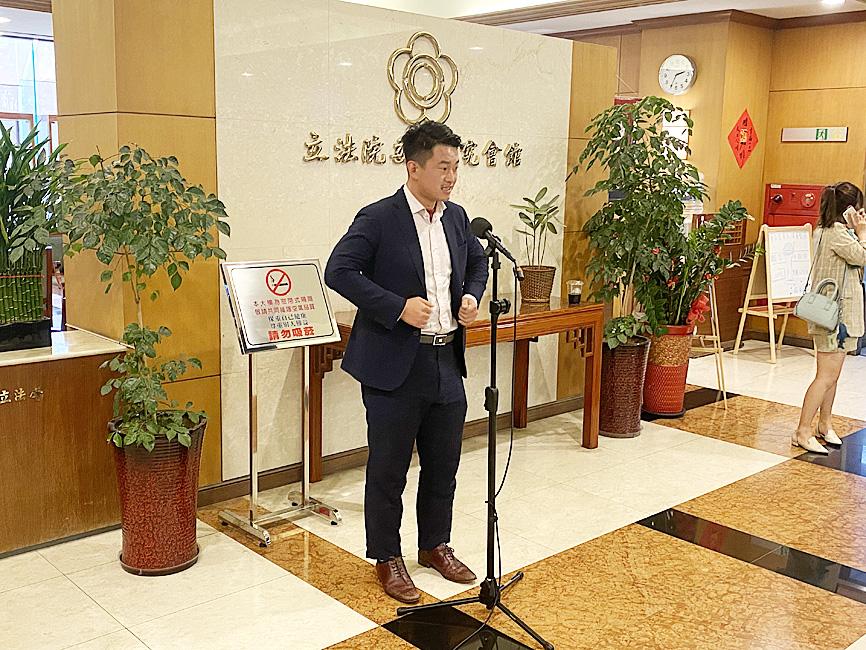The Legislative Yuan yesterday resolved to update the nation’s passport to highlight the Chinese and English for “Taiwan,” and to devise “feasible” ways to rename state-run China Airlines Ltd (CAL, 中華航空) to differentiate it from its Chinese counterpart, Air China.
Motions tendered by Taiwan Statebuilding Party Legislator Chen Po-wei (陳柏惟) and the Democratic Progressive Party (DPP) caucus on the passport cover, and by the DPP and New Power Party caucuses on the name of the airline were voted on yesterday.
The proposals submitted by the DPP caucus won both votes.

Photo: Wu Su-wei, Taipei Times
The first resolution mandates that the English and Chinese for “Taiwan” should be highlighted on the passport to prevent Taiwanese from being confused with Chinese, to uphold their dignity and ensure their safe passage amid the COVID-19 pandemic, which originated in China.
The second resolution says that the international community has often confused China Airlines with Air China and to avoid that, the Ministry of Transportation and Communications should devise ways to set China Airlines planes apart from those of Air China.
China Airlines in the short term should add Taiwanese motifs to the fuselages of its aircraft so that the nation’s air rights would not have to be renegotiated, it says.
The ministry in the long term should devise feasible ways to change the English-language name of China Airlines, it says.
The motions were drafted after reports of Asians being discriminated against overseas due to the COVID-19 pandemic and batches of masks wrapped in banners reading “China Airlines” misleading recipients into thinking that they were donated by China.
The ministry said that it has instructed the China Aviation Development Foundation (中華航空事業發展基金會) — China Airlines’ largest shareholder — to form a consultancy team to discuss the legislature’s resolution.
China Airlines said that it had no comment on the resolution.
Ministry of Foreign Affairs spokeswoman Joanne Ou (歐江安) said in a statement that the foreign ministry would collect feedback on how the nation’s passport should be redesigned.
Additional reporting by Shelley Shan and Lin Chia-nan

Intelligence agents have recorded 510,000 instances of “controversial information” being spread online by the Chinese Communist Party (CCP) so far this year, the National Security Bureau (NSB) said in a report yesterday, as it warned of artificial intelligence (AI) being employed to generate destabilizing misinformation. The bureau submitted a written report to the Legislative Yuan in preparation for National Security Bureau Director-General Tsai Ming-yen’s (蔡明彥) appearance before the Foreign Affairs and National Defense Committee today. The CCP has been using cognitive warfare to divide Taiwanese society by commenting on controversial issues such as Taiwan Semiconductor Manufacturing Co’s (TSMC, 台積電) investments in the

INVESTIGATION: The case is the latest instance of a DPP figure being implicated in an espionage network accused of allegedly leaking information to Chinese intelligence Democratic Progressive Party (DPP) member Ho Jen-chieh (何仁傑) was detained and held incommunicado yesterday on suspicion of spying for China during his tenure as assistant to then-minister of foreign affairs Joseph Wu (吳釗燮). The Taipei District Prosecutors’ Office said Ho was implicated during its investigation into alleged spying activities by former Presidential Office consultant Wu Shang-yu (吳尚雨). Prosecutors said there is reason to believe Ho breached the National Security Act (國家安全法) by leaking classified Ministry of Foreign Affairs information to Chinese intelligence. Following interrogation, prosecutors petitioned the Taipei District Court to detain Ho, citing concerns over potential collusion or tampering of evidence. The

‘COMPREHENSIVE PLAN’: Lin Chia-lung said that the government was ready to talk about a variety of issues, including investment in and purchases from the US The National Stabilization Fund (NSF) yesterday announced that it would step in to staunch stock market losses for the ninth time in the nation’s history. An NSF board meeting, originally scheduled for Monday next week, was moved to yesterday after stocks plummeted in the wake of US President Donald Trump’s announcement of 32 percent tariffs on Taiwan on Wednesday last week. Board members voted to support the stock market with the NT$500 billion (US$15.15 billion) fund, with injections of funds to begin as soon as today. The NSF in 2000 injected NT$120 billion to stabilize stocks, the most ever. The lowest amount it

NEGOTIATIONS: Taiwan has good relations with Washington and the outlook for the negotiations looks promising, Minister of Economic Affairs J.W. Kuo said Taiwan’s GDP growth this year is expected to decrease by 0.43 to 1.61 percentage points due to the effects of US tariffs, National Development Council (NDC) Minister Paul Liu (劉鏡清) said at a meeting of the legislature’s Economics Committee in Taipei yesterday, citing a preliminary estimate by a private research institution. Taiwan’s economy would be significantly affected by the 32 percent “reciprocal” tariffs slapped by the US, which took effect yesterday, Liu said, adding that GDP growth could fall below 3 percent and potentially even dip below 2 percent to 1.53 percent this year. The council has commissioned another institution